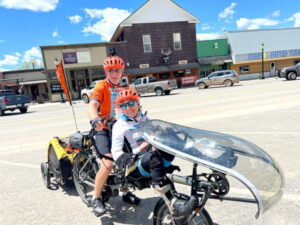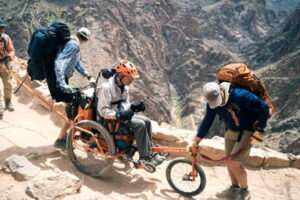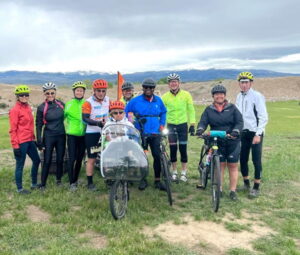05 Jul Adventures: A Step Beyond Engagement
The following article was originally published by American Stroke Association on July 5, 2022 on their website.
In our last column, we wrote about the importance of re-engaging in life’s activities, even when it’s difficult to do. This engagement is a crucial part of emotional recovery as we rebuild our identities and rewarding lives.
To be sure, many of these activities now require adaptation, which can make them adventures for sure. We wrote about adaptation in our October 2021 column.
We also wrote about it in Chapter 13 of Identity Theft: Rediscovering Ourselves After Stroke: “We can’t always completely choose our family, friends, relationships, or careers, but our activities and hobbies are selected precisely for how we want to live and who we want to be.”
We certainly see it as an adventure to reclaim activities by finding new ways to do them. Often these adventures require us to change how we define success. But we don’t think adventures need to stop there. We can also pursue adventures that would have been adventures even before a stroke.
Of course, everyone has a different thirst for adventure. For many people, a certain amount of adventure is an important way to achieve personal growth, which contributes to a sense of happiness and fulfillment.
Many survivors have told us how their ordeal with stroke has helped them re-focus on what is really important to them. In some cases that has sharpened their desire for adventure—especially with family and friends.
 Speaking of adventures, we are on a significant one right now! As we draft this column, we have completed about 25% of Stroke Across America, riding our tandem bicycle 4,300 miles from Astoria, Oregon, to Boston to raise awareness for stroke and aphasia.
Speaking of adventures, we are on a significant one right now! As we draft this column, we have completed about 25% of Stroke Across America, riding our tandem bicycle 4,300 miles from Astoria, Oregon, to Boston to raise awareness for stroke and aphasia.
Steve, a carepartner, is the driver for this adventure. He’s wanted to ride across the country for decades. Debra is a willing and eager accomplice. Doing it for a purpose was a motivator for both of us. If you are part of a couple and believe like we do that stroke is a family illness, it’s important to find adventures that are fulfilling to both survivor and carepartner.
Staying Realistic
Most adventures are, of course, more difficult after a stroke. There is a risk of biting off more than you can chew. The constraints on a survivor’s ability to have an adventure depend a lot on the nature and extent of disabilities, and the amount of available support from family and friends. That is true not just with respect to the adventure activities, but also for organizing and preparation for them. That said, our observations suggest that survivors—and their carepartners—are more likely to err on the side of hesitation, not overreaching.
Realism doesn’t have to be constraining. Rather, it can inspire innovation. Two days before we started riding in Astoria we were honored to be guests at an event hosted by Stroke Awareness Oregon in Bend. There we met Geoff Babb, an avid outdoorsman who suffered a brain stem stroke.
 Geoff loved the outdoors and didn’t want to lose his ability to enjoy it. With help from some friends, he modified his wheelchair with beefy wheels and other adaptations so friends could take him where he can enjoy what he calls “the tonic of nature.”
Geoff loved the outdoors and didn’t want to lose his ability to enjoy it. With help from some friends, he modified his wheelchair with beefy wheels and other adaptations so friends could take him where he can enjoy what he calls “the tonic of nature.”
Geoff is an adventurer of the extreme kind, so he kept making his chair tougher and tougher. He’s now on version 3 of what he calls the AdvenChair—half wheelchair and half mountain bike, with plenty of holding points for friends to help him over rough terrain. He recently returned from a successful trip up and down the Bright Angel Trail in Grand Canyon National Park.
When we exchanged emails recently, Geoff acknowledged that he’s proud of their arduous accomplishment in the Grand Canyon. But he is even more proud of what his invention has allowed others to do.
People with Parkinson’s disease have revisited favorite trails or lakes. People on hospice or palliative care have gone to a special place one last time. Kids with disabilities are more fully participating in an outdoor school or a summer camp for kids with cancer. The right adaptive equipment certainly can make adventures more possible, and Geoff is motivated to help more people enjoy the “tonic of nature.”
Adventures don’t have to be big. They don’t have to be long. They don’t have to be physically demanding or dangerous. We focus on the fact that adventures are unusual, exciting, a bit challenging and may involve exploring your personal unknown. Is there a city or state you’ve always wanted to visit? Is a national park on your wish list? Or is there a local park you’ve wanted to walk or roll—again or for the first time—that has felt just a bit out of reach? What’s routine for someone else may be your perfect adventure.
Big or small, adventures are an opportunity not only to do something you enjoy, but to personally grow.
For us, a 100-day bicycle trip is taking us to new places—not just in our country, but in better understanding ourselves and our relationship. We’re learning to better navigate our different approaches to planning, adversity and flexibility.
 We’re learning when and how we like to meet new people, which this trip is reminding us how much we both value. And given the length of our adventure, we have plenty of time to talk about how we most like to adventure and other adventures we want to build into our lives ahead. This is all part of our recovery process from Debra’s stroke—rebuilding our identities and rewarding lives.
We’re learning when and how we like to meet new people, which this trip is reminding us how much we both value. And given the length of our adventure, we have plenty of time to talk about how we most like to adventure and other adventures we want to build into our lives ahead. This is all part of our recovery process from Debra’s stroke—rebuilding our identities and rewarding lives.
And, of course, we’ve already had some spectacular, dramatic, challenging and funny parts of this big adventure. Stay tuned for more of those details after we make it to Boston!

No Comments